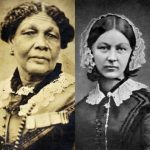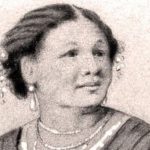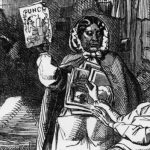Black statue of Mary Seacole unveiled in London
A memorial statue believed to be the UK’s first in honour of a named black woman has been unveiled in London.
Mary Seacole was a Jamaican-born nurse who cared for wounded British soldiers during the Crimean War in the 19th Century.
The statue’s completion follows a 12-year campaign which raised £500,000 to honour her.
Tottenham MP David Lammy said it was a “seminal moment for Londoners, and for the black community particularly.”
Actress and broadcaster Baroness Benjamin unveiled the statue.
Emeritus Professor of Nursing Elizabeth Anionwu said the unveiling was “extremely significant” because it was believed to be the first memorial statue of a named black woman in the UK.
“For somebody like myself, a nurse of mixed heritage – Mary was Jamaican-Scottish, I’m Nigerian-Irish heritage – there’s a link there.
“I have an eight-year-old granddaughter, and at last youngsters will be able to see a beautiful monument that they can identify with.”
“Too often difference gets written out of history,” said Mr Lammy.
“Mary Seacole’s pioneering work saved lives and people of all backgrounds can draw inspiration from the fact that her achievements have finally been recognised.”
‘Aid and succour’
The statue was created by sculptor Martin Jennings and stands opposite the Houses of Parliament in the grounds of St Thomas’ Hospital.
It is inscribed with words written in 1857 by The Times’ Crimean War correspondent, Sir William Howard Russell: “I trust that England will not forget one who nursed her sick, who sought out her wounded to aid and succour them, and who performed the last offices for some of her illustrious dead.”
In November, Chancellor George Osborne announced the Treasury would contribute £240,000 to help pay for the installation.
In 2013 transport charity Sustrans depicted Mary Seacole alongside other figures as part of their Portrait Bench Series commemorating local heroes. The two-dimensional steel portrait can be found along the walking and cycling route in Paddington Green, along with code-breaker Alan Turing and the children’s character Paddington Bear.
Born to a Scottish soldier and a Jamaican woman in 1805, Mary Jane Grant learned her nursing skills from her mother, who kept a boarding house for invalid soldiers
She and her family had few civil rights – they could not vote, hold public office or enter the professions
Married Edwin Seacole in 1836 – he died eight years later
She travelled widely and studied traditional and European medical ideas
In 1854, she travelled to England and approached the War Office, asking to be sent as an Army nurse to the Crimea
She was refused but went anyway. Once there, she established the British Hotel near Balaclava to provide “comfortable quarters for sick and convalescent officers” and also nursed the wounded on the battlefield – sometimes under the hail of gunfire
She became known as “Mother Seacole” and, at the time, her reputation rivalled that of Florence Nightingale
After the war she returned to England destitute and in ill health
In July 1857 a benefit festival was organised to raise money for her, attracting thousands of people
She died on 14 May 1881
“If you have a statue for Florence Nightingale, you should have one for Mary Seacole,” said the historian Dr Ron Ramdin, who wrote her biography.
“She had no privileges. She had to make her own way, which in the 19th Century for a black woman was very difficult.
“The fact that when she met Florence Nightingale and she did not get the job nursing in the Scutari hospital didn’t faze her. She continued on her way to the front.”
IMAGES:
Image copyright Miller Hare Image caption The statue stands opposite the Houses of Parliament in the grounds of St Thomas’ Hospital
Image copyright Getty Images Image caption Punch magazine pays tribute to Mary Seacole during the Crimean War in 1857
Mary Seacole, 1805-1881 Image copyright Getty Images
For more on this story go to: http://www.bbc.com/news/uk-england-london-36663206
Related story:
Why is there bitterness over a black Jamaican nurse getting an 8-foot statue in London?
By Victor Ochieng From blacklikemol
Later this month, an 8-foot-tall statue of Mary Seacole, a Black Jamaican nurse, will be erected at St. Thomas’ Hospital in London. This hasn’t gone down well with supporters of English war nurse Florence Nightingale. Some historians argue that Seacole didn’t achieve much, but her achievements were exaggerated for political pursuits.
The statue, which is expected to cost an amount of $730,000, will be the first of its kind to be erected in honor of the nurse, who got her background in herbal medicine in the Caribbean. During the Crimean War, Seacole established a “British Hotel,” a boarding house in which British soldiers received medical attention as well as food and beverages. Her services ended up saving many lives.
Her story is currently being taught in British schools. Seacole is also recognized for her role in improving race relations and nursing. She’s been floated as the greatest Black Briton, but her recently announced recognition isn’t going down well with the Florence Nightingale Society.
“The hype that has been built up surrounding this otherwise worthy woman is a disgrace to the serious study of history,” William Curtis of the Crimean War Research Society said to the Daily Mail.
A Nightingale biographer Mark Bostridge dismissed the recognition being accorded to Seacole, saying the retelling of her story is nothing but a “campaign of misinformation.” He even complained about the height of her new statue, saying it’s taller than that of Nightingale at Pall Mall. He went ahead to dismiss Seacole’s works, claiming they “took place post-battle, after selling wine and sandwiches to spectators.”
According to history professor Lynn McDonald, Seacole had no working relationship with any established hospital and thus shouldn’t have her statue erected at St. Thomas. On the other hand, Nightingale was an Italian woman born and bred in wealth and would earn her nursing experience while working in Germany before moving to work in Paris. At the height of the Crimean War, Nightingale was offering services at the British military hospital, where she helped in amputations and dressing of wounds before she later established a nursing school in St. Thomas.
Plans to erect the Seacole’s bronze statue are still ongoing. She’ll be depicted carrying a medical bag with medals around her chest as she matches to the battlefield. The statue, which was created by Martin Jennings, is set to be unveiled in June 30.
“The unveiling will be a truly memorable event, and after 12 years of campaigning, we look forward to finally granting Mary Seacole the acknowledgement she deserves for her selfless support of British soldiers,” Labour Party member Clive Soley, who was very instrumental in the decision to grant the memorial, told the website. “The statue will be a fantastic new landmark on the South Bank providing much-needed recognition of the contribution black and ethnic minorities have made throughout British history and a celebration of the UK’s diversity.”
IMAGE: By Sinclair Grey seacole-nightingale-1-300×300
For more on this story go to: http://blacklikemoi.com/2016/06/why-is-there-bitterness-over-a-black-jamaican-nurse-getting-an-8-foot-statue-in-london/








